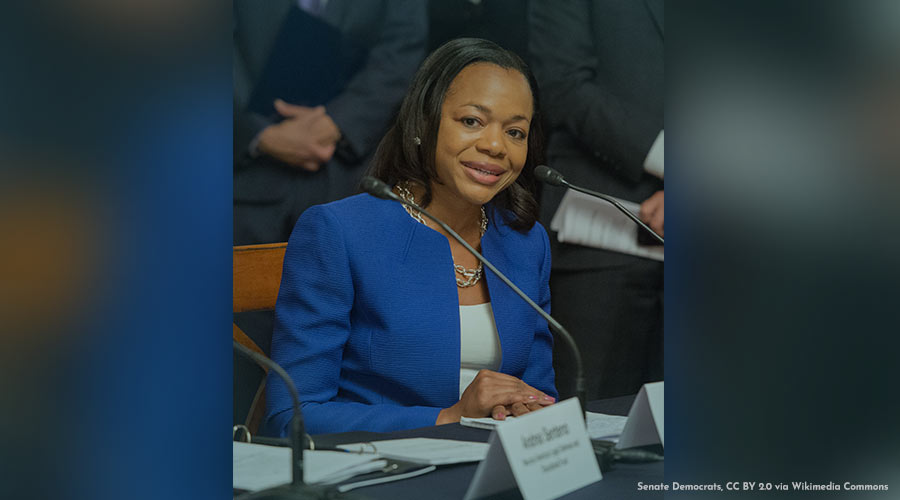Sworn into office by Vice President Kamala Harris on May 25, 2021, Kristen M. Clarke is Assistant Attorney General for Civil Rights at the U.S. Department of Justice (DOJ). And as Harris holds firsts for her office, Clarke is also the first woman and first Black woman to hold her position.
Symone Sanders, spokesperson for Vice President Harris, called Clarke’s confirmation an “historic moment,” for the office, which was created following the enactment of the Civil Rights Act of 1957.
“Kristen Clarke is singularly qualified to lead (the Justice Department’s Civil Rights Division) particularly in this moment in history,” said Sen. Dick Durbin, a Democrat representing Illinois said following her confirmation.
Her confirmation by the U.S. Sentate came on the anniversary of George Floyd’s murder. The office Clarke leads was investigating police departments in Minneapolis, Minnesota, and Louisville, Kentucky, for alleged use of unreasonable force and discrimination against people of color and/or people with disabilities, according to Reuters.
Clarke comes to office in the middle of a flurry of Republican-sponsored voting legislation at the state level, which could make it harder for urban and ethnic minority voters to participate in open elections.
Though Clarke’s position at the DOJ is not partisan, her confirmation was due to Democratic votes with Rep. Susan Collins of Maine as the sole Senate Republican to vote in Clarke’s favor.
Who is Kristen Clarke?
Clarke graduated with a Bachelor of Arts from Harvard University and received her law degree from Columbia University School of Law. And, like Vice President Harris, Clarke is a first-generation American, the child of immigrants. Clarke’s parents were both born in Jamaica before resettling in the United States.
Clarke has most recently served as the president and executive director of the Lawyers Committee for Civil Rights Under Law (LCCRUL), a social justice nonprofit without political affiliation, created at the request of John F. Kennedy. The LCCRUL’s mission is to work to “secure equal justice within the legal system, especially where it intersects with the systemic inequities faced by African Americans and other racial and ethnic minorities.” Robert F. Smith was honored by the LCCRUL with the Robert F. Kennedy Justice Prize in 2020 for his social justice advocacy.
According to the DOJ, before taking the position at the LCCRUL, Clarke was the civil rights chief for the New York State Attorney General’s Office. She also previously worked for the NAACP legal Defense and Education Fund, a nonprofit primarily focused on civil rights.
What is the U.S. DOJ and What Does it Do?
As mentioned above, the Civil Rights Division of the Department of Justice was created in 1957. The Division’s work is “to uphold the civil and constitutional rights of all Americans, particularly some of the most vulnerable members of our society,” according to the DOJ. What this means is that the Division enforces federal laws protecting civil rights and prosecutes those that seek to discriminate on “the basis of race, color, sex (including pregnancy, sexual orientation, and gender identity), disability, religion, familial status, national origin, and citizenship status.”
The Civil Rights Division is led by the Assistant Attorney General, Clarke. The Division is one of a dozen other divisions that fall under the purview of Associate Attorney General Vanita Gupta, who was sworn in shortly before Clarke in April 2021.
Upon being sworn in, Clarke wrote of the great responsibility her office holds, as she formally announced the filing of a lawsuit against the State of Georgia. The charge is that by rushing to pass a bill, SB 202, the Georgia legislature violated Section 2 of the Voting Rights Act of 1965. The Voting Rights Act was created to protect the Civil Rights of all eligible voters following the fight for fair and equal suffrage by Black Americans, which captured national attention with the famous Selma march led by Rev. Dr. Martin Luther King Jr. and former House Georgia Rep. John Lewis.
“The Georgia legislature passed SB 202 through a rushed process that departed from normal practice and procedure,” Clarke stated. “[…] Our complaint challenges several provisions of SB 202 on the grounds that they were adopted with the intent to deny or abridge Black citizens equal access to the political process.”
This, according to Clarke’s statement, would constitute a violation of the civil rights of those voters in direct opposition to the hard won Voting Rights Act. That act helped eliminate discriminatory practices, A.K.A. Jim Crow laws, passed by states, which barred Black and ethnic minority voters from taking part in the electoral process.
Are Our Civil Rights in Danger Right Now?
The short answer is that many people do believe that our Civil Rights are in peril. Here’s some recent background to get to where we are today.
Back in 2013, the Supreme Court decided to invalidate something called “preclearance,” which was instituted as part of the Voting Rights Act of 1965. The preclearance rule meant that state voting laws were required to be screened by federal oversight before being enacted. This was one of the ways in which voting rights for African Americans had been protected. The justification was that preclearance was out-of-date and no longer necessary.
However, following the last election, in which Georgia saw record voter turnout and flipped blue, and other states saw closer calls than previous years, a new crop of restrictive voting laws arose and are now being argued in state governments across the country. At the same time, Congress has yet to pass two federal voting rights bills: the For the People Act and the John Lewis Voting Rights Advancement Act. Both acts would serve to bolster the Voting Rights Act by addressing equitable access to voting across the nation.
Read more about the Voters Rights Bills. And learn about our ancestors who sacrificed and fought to guarantee our Civil Rights with the Webby-award winning video podcast Black History in Two Minutes.






